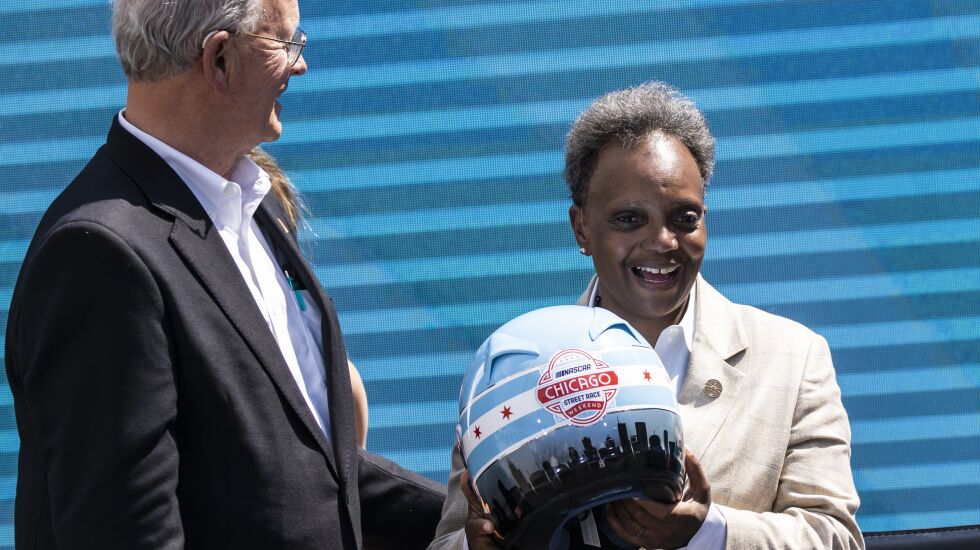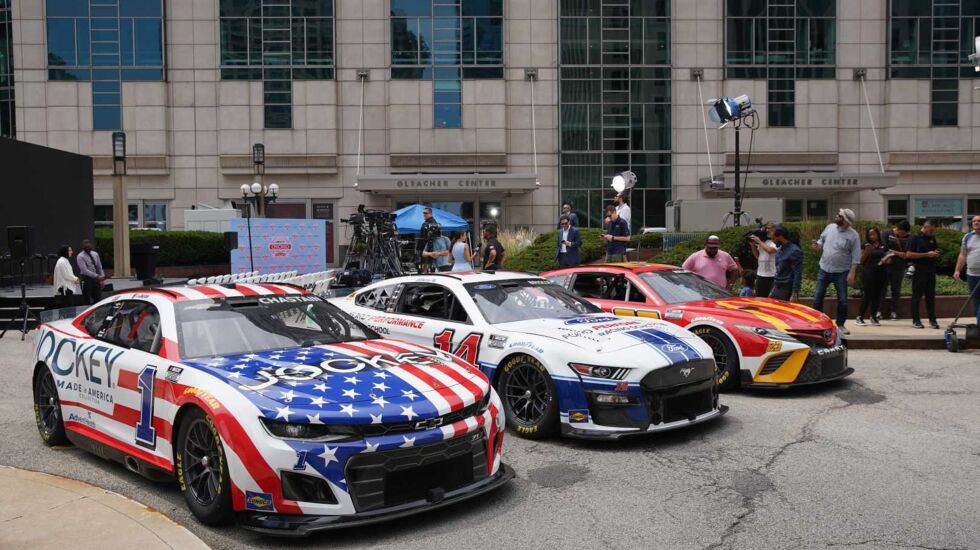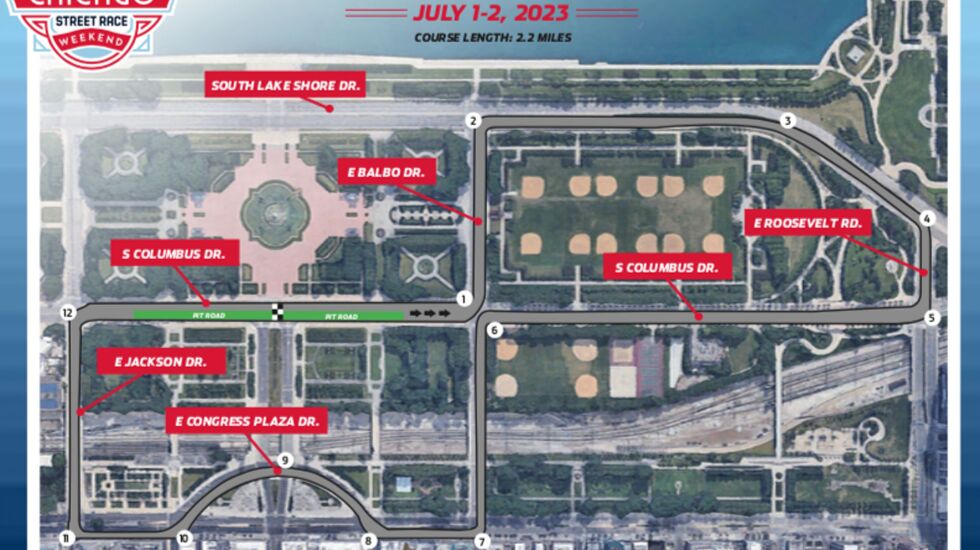
Race cars zooming through downtown Chicago next July will undoubtedly make Grant Park look like a scene from the next installment of the Fast and Furious franchise.
Except in this movie, “the fast” refers to the speed at which the city agreed to host a NASCAR street racing weekend and “the furious” are Chicago City Council members who say the entire deal lacks transparency or sound economic sense.
Controversy surrounding next July’s race weekend — a first for NASCAR and for Chicago — started in the summer. Mayor Lori Lightfoot announced she had signed a three-year deal that, in July of next year, will turn the streets around Grant Park, the Museum Campus and even Michigan Avenue into a 2.2-mile racecourse.
Interviews with City Council members, experts and a WBEZ analysis of the contract show minimal financial benefit to the city and few specifics about who pays for related costs, such as security and clean up. Questions about who’s left with the tab and whether Lightfoot overreached with the hasty deal could become a flashpoint in the mayoral race.
In an emailed response to questions, Lightfoot’s office said the most tangible benefits of the weekend NASCAR event will be in the “positive impact” to area businesses from thousands of race fans. The race was likened to “premier events,” such as Lollapalooza and NBA All-Star weekends.
A spokesperson for the mayor cited a report commissioned by NASCAR that promises $100 million in related tourism and construction revenues to Chicago, which includes people hired to set up the event as well as money spent by attendees — on shopping, hotels, restaurants, transportation and entertainment.
Repeated interview requests were denied.
Council members, on the other hand, said the deal lacked transparency from the start.
“I’m all for economic development, but the issue I have with it is lack of communication and transparency around how this project came to fruition,” said Ald. Gilbert Villegas (36th), whose ward stretches west along Fullerton Avenue. Villegas said the mayor’s office has refused to meet with Council members, give them the contract or even provide an “in-depth briefing” on the race.
Details likely were kept scarce to help NASCAR “navigate the politics of it,” said FOX Sports NASCAR reporter Bob Pockrass, by “keeping things between as few parties as possible to get the deal done.”
A closer look at the contract
The contract, obtained by WBEZ via a Freedom of Information Act request, shows NASCAR must pay the city a $500,000 permit fee per year, a guarantee of 15% of net commissions on concession and merchandise, $2 per admission ticket and a $50,000 security deposit for damages to Grant Park.
The permit fee rises to $550,000 in 2024 and $605,000 in 2025. There’s an option of a two-year extension. NASCAR, based in Florida, also is guaranteed total broadcast, sponsorship and signage rights.
In an email, NASCAR spokesperson Brent Gambill said “NASCAR will be responsible for security” but would not specify details. The contract does not specify security costs by either the city or NASCAR, nor does it indicate how much the organization must pay the Chicago Park District to restore the park beyond the $50,000 security deposit.
Instead, the contract says a third-party landscape contractor will survey the site before and after the race and provide “a damage assessment and restoration estimate” for all parties “to review and agree upon.” NASCAR, the contract says, is ultimately on the hook for that.
The contract also specifies park district officials will receive, “at no charge, NASCAR credential passes and general admission tickets.”
As for how the event came to captivate the mayor’s office, it apparently started with a video simulation.
In July 2021, NASCAR partnered with iRacing, an online video simulation company, to launch a one-day street race set in a virtually scanned downtown Chicago that pitted professional drivers against one another.
“It was almost a feasibility study of how it can be done” in the real world, said NASCAR’s Street Course President Julie Giese. By the end, “both NASCAR and the city of Chicago looked at each other and said, ‘Let’s figure out how to make that a reality’,” Giese said.
The Chicago race is an outgrowth of a steady push by NASCAR to broaden its audience.
Last February, the Busch Light Clash, a race with a 32-year history at the Daytona International Speedway, was moved to the Los Angeles Memorial Coliseum — where, Giese said, a “staggering” 70% of attendees had never attended a NASCAR event.
“Chicago is the next step” of “introducing our sport to a whole new audience,” she said.
Giese expects 100,000 people to attend the July 1-2 event. It will be structured like a festival — fans will purchase a two-day pass to the area around the track, where there will be an “A-list” concert each night in Hutchinson Field. Food, vehicle displays and interactive games will be at Buckingham Fountain.
Ticket prices — $269 for general admission and $465-plus for reserved seating — are higher than typical races, she said.
Racing on a street grid is a greater challenge for drivers, said Pockrass of FOX Sports, with tighter turns, no run-offs and minimal time for drivers to test-drive the route.
“The unknown is not something many drivers relish,” he said, “but I think the event is something that they are all excited about.”

Questions about who’s paying for parks, police
From the moment in July Lightfoot announced the race, Council members, park advocates and community groups complained she’d overreached on a fiscally irresponsible deal.
Ald. Brendan Reilly (42nd), whose ward includes part of the course, was among a few Council members summoned to meet NASCAR officials less than 24 hours before the announcement. The meeting “was a whopping 15 minutes and certainly didn’t go into any detail” about what Lightfoot would soon announce alongside NASCAR CEO Jim France and driver Bubba Wallace.
“There was absolutely no transparency, whatsoever,” Reilly said. The meeting, he said, “was done simply so the mayor could check a box to say, ‘Well, the aldermen were aware.’” (In August Lightfoot told reporters “all” Council members “were briefed ahead of time.”)
Then there’s the destination music festival Lollapalooza, which descends on downtown every August. While each event contract is structured differently, Lollapalooza’s commitment to the city for its weekend is far more extensive than the deal Lightfoot worked out with NASCAR.
In its new contract, which extends the festival in Grant Park through 2032, Lollapalooza pays the city a guarantee of $2 million for the four-day festival and even $750,000 if the festival is not held. (NASCAR pays the city nothing if the race is canceled.)
The park district also earns 5% of the first $30 million in Lollapalooza revenue and 20% of revenue generated between $50 million to $70 million, according to the city. On top of that, Lollapalooza producers have committed $2.2 million to the Chicago Public Schools with additional, although unspecified, funding for the park district and Grant Park tennis courts renovation.
In July, Lightfoot announced Lollapalooza generated $305 million for the city’s economy in 2021 alone, including $7.8 million in fees to the park district.
Robert Baade, a sports economist at Lake Forest College, is a national expert on the intersection between municipalities and professional sports. He was “surprised” at the $500,000 financial commitment by NASCAR, calling it “not nearly enough to make up for what it is that the city will surely incur in costs to host the event.”
That includes police overtime, costs to restore parks and streets — but also lost revenue from tourists who normally come downtown every Fourth of July weekend but now may stay away.

As with any large-scale gathering downtown, the NASCAR event will require a heavy police presence, something even Chicago Police Supt. David Brown suggested in October would create a manpower issue. Following the mayor’s announcement in July, Brown said an “explosion” of special events downtown is forcing his department’s overtime costs to skyrocket.
Public parks advocates also say the race follows a disturbing trend.
“I don’t know what the plan is for cleanup afterwards,” said Juanita Irizarry, executive director of Friends of the Park, an advocacy group. She sees the race as part of a trend by Lightfoot and past administrations to view parks as “largely about revenue generation” and not recreation or tranquility.
Giese said NASCAR is committed to making sure the park “looks as great as it did as when we arrived.”
While Buckingham Fountain will reopen to the public in time for the Fourth of July, race structures, such as grandstands, will take longer to remove.
The weeks of set up and teardown for NASCAR could impact visitors to the Field Museum, Shedd Aquarium and the Art Institute of Chicago. Art Institute officials also had reportedly expressed concern about vibrations from the noisy street cars putting fragile art in peril.
Spokesperson Katie Rahn said the Art Institute is “looking forward to welcoming visitors throughout the race weekend.”
Baade, the Lake Forest College professor, said most municipalities that turn to professional sports as easy cash spigots often fail to understand that residual revenue gains rarely equal or surpass the direct revenue gains enjoyed by the organizers, who are usually never local.
“The hope is that people will come to Chicago and be awestruck by the beauty of the city and tourism will be spiked and induced well into the future as a consequence of the event,” Baade said.
“That sort of promise is something that we often see regarding mega sports events but seldom materializes.”
Mark Guarino is a freelance journalist for WBEZ.







